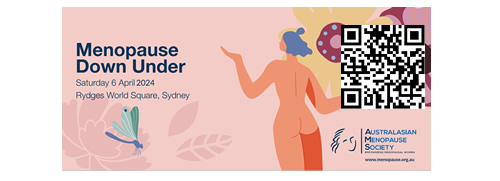3 January 2019:
A study followed women from the Women's Health Initiative trials for nearly 18 years to examine association between persistent vasomotor symptoms and breast cancer incidence and mortality
Studies examining the association between vasomotor symptoms (VMS) and breast cancer are not new, but results have been inconsistent. A new larger-scale study concludes that women participating in the Women's Health Initiative (WHI) trials who had persistent VMS are more likely to be diagnosed with breast cancer than women who never experienced VMS.
Data was gathered from more than 25,000 women who participated in the WHI for this latest study that sought to identify an association between VMS (which includes symptoms such as hot flushes and night sweats) and breast cancer. Through 17.9 years' follow-up of these women, 1,399 incident breast cancers were seen. Women with persistent VMS (defined as symptoms that lasted 10 or more years) had a higher breast cancer incidence than women who never experienced VMS.
Although breast cancer-specific mortality was higher in women with persistent VMS, the difference was not statistically significant, which meant that persistent VMS did not influence breast cancer survival rates.
The possible link between VMS and breast cancer continues to be studied because of a common association with hormones. Specifically, hormone therapy has proven to be the most effective treatment for VMS, whereas sex hormone levels also are related to postmenopause breast cancer risk.
Abstract
Objective:
Vasomotor symptoms (VMS) including hot flushes and night sweats are common during the menopausal transition and may persist. Although VMS pathophysiology is complex, estrogen's efficiency as VMS therapy suggests hormonal environment change may influence this process. As studies of VMS and breast cancer are inconsistent, we examined associations between persistent VMS and breast cancer incidence and mortality.
Methods:
The analytic sample included 25,499 postmenopausal women aged 50 to 79 in the Women's Health Initiative (WHI) without current/former menopausal hormone therapy use with information on VMS status (never vs persistent). Breast cancers were verified by medical record review. Cause of death attribution was enhanced by serial National Death Index queries. Associations between VMS status and breast cancer incidence and mortality was determined using time dependent Cox regression analyses adjusted for breast cancer risk factors.
Results:
Through 17.9 years (median) follow-up, 1,399 incident breast cancers were seen. Women with persistent VMS (VMS median duration 10+ years) (n = 9,715), compared to women with never VMS (n = 15,784), had a higher breast cancer incidence (hazard ratio [HR] 1.13 95% confidence interval [CI] 1.02-1.27). While breast cancer-specific mortality was higher in women with persistent VMS (HR 1.33 95% CI 0.88-2.02), the difference was not statistically significant. Persistent VMS status had no influence on breast cancer overall survival (HR 1.02 95% CI 0.81-1.29).
Conclusion:
Women with persistent VMS are more likely to be diagnosed with breast cancer than women who never experienced VMS, but not more likely to die from breast cancer.
Reference
Chlebowski RT, Mortimer JE, Crandall CJ, Pan K, Manson JE, Nelson R, Johnson KC, Vitolin MZ, Lane D, Wactawski-Wende J, Kwan K, Stefanick ML. Persistent vasomotor symptoms and breast cancer in the Women's Health Initiative. Menopause. 2018 Dec 28. doi: 10.1097/GME.0000000000001283. [Epub ahead of print]






